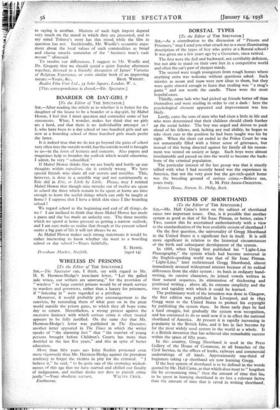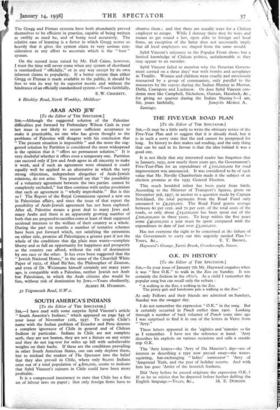SYSTEMS OF SHORTHAND .
(To the Editor of THE SPECTATOR.] SIR,—Mr. Hall Caine's letter on the subject of shorthand raises two important issues. One, is it possible that another system as good as that of Sir Isaac Pitman, or better, exists ? Two, cannot this be ascertained authoritatively with a view to the standardisation of the best available system of shorthand ?
On the first question, the universality of Gregg Shorthand in the United States is a significant fact in itself. It is still more significant in relation to the historical circumstances of the birth and subsequent development of the system.
In 1888, when Gregg first published his " Light-Line Phonography," the system which had become universal in the English-speaking world was that of Sir Isaac Pitman. " Light-Line," later rechristened Gregg Shorthand, almost immediately aroused widespread interest because of its radical differences from the older system : its basis in ordinary hand- writing, its cursive character, its joined vowels written in their natural sequence, its elimination of thickening and positional writing ; above all, its extreme simplicity and the ease and rapidity with which it could be learned.
The preliminary work of the invention was done in Glasgow, the first edition was published in Liverpool, and in 1893 Gregg went to the United States to protect his copyright by publishing the system there. In those early days he had a hard struggle, but gradually the system won-recognition, and has continued to do so until now it is in effect the national shorthand of America. At present it is rapidly increasing in popularity in the British Isles, and it has in fact become by far the most widely used system in the world as a whole. It is a British invention that has achieved this remarkable success within the space of fifty years.
In thi, country, Gregg Shorthand is used in the Press Gallery of the House of Commons, in all branches of the Civil Service, in the offices of banks, railways and commercial undertakings of all kinds. Approximately one-third of beginners taking rp shorthand are now learning Gregg. If the best system of shorthand is to be defined in the words quoted by Mr. Hall Caine, as that which does most to " lengthen life by economising time," then the amount of time that has to be spent in learning shorthand is no less a relevant factor than the amount of time that is saved in writing shorthand. The Gregg and Pitman systems have both abundantly proved themselves to be efficient,in practice, capable of being written as swiftly as need be, and of being read accurately. The relative ease of learning is a factor in which Gregg scores so heavily that it gives the system claim to very serious con- sideration in any effort to ascertain which is the " best " system.
On the second issue raised by Mr. Hall Caine, however, I trust the time will never come when any system of shorthand is standardised " officially," or in any way except by its own inherent claims to popularity. If a better system than either Gregg or Pitman is made available to the public, it should be free to win its way by its superior merits and without the hindrance of an officially standardised system.—Yours faithfully, E. W. CaocacErr.
6 Blockley Road, North Wembley, Middlesex







































 Previous page
Previous page